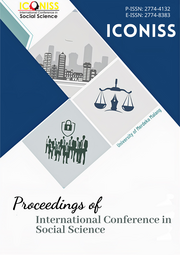Family Hope Program to Improve Community Welfare (Policy Implementation Study Based on the Regulation of the Minister of Social Affairs of the Republic of Indonesia Number 1 of 2018 concerning the Family Hope Program)
DOI:
https://doi.org/10.26905/iconiss.v3i1.9831Keywords:
Community welfare, Family hope program, Policy implementation, Poor and vulnerable poor familiesAbstract
The issuance of the Regulation of the Minister of Social Affairs of the Republic of Indonesia Number 1 of 2018 concerning the Family Hope Program is aimed at improving the living standards of beneficiary families through access to education, health, and social welfare services. However, in its implementation in Teluk Pandan District, East Kutai Regency, it turns out that the program has not been communicated clearly and transparently and has not reflected a sense of justice for the local community. Based on these problems, this study aims to describe and analyze the implementation of the Family Hope Program to improve community welfare based on the Regulation of the Minister of Social Affairs of the Republic of Indonesia Number 1 of 2018 in Teluk Pandan District, East Kutai Regency, and to describe and analyze the supporting and inhibiting factors in the implementation of the program. By using a qualitative descriptive approach and based on Edward III's Public Policy Implementation Theory, this study concludes that: (1) The Family Hope Program to improve community welfare based on the Regulation of the Minister of Social Affairs of the Republic of Indonesia Number 1 of 2018 in Teluk Pandan District, East Kutai Regency, seen from the variables of communication, resources, disposition, and bureaucratic structure has been successfully implemented although it is still not optimal. (2) Factors that support the implementation of the Family Hope Program to improve community welfare in Teluk Pandan District, East Kutai Regency, namely the availability of information resources and sufficient budget resources; Meanwhile, factors that hinder the implementation of the program include uneven program communication, poor quality human resources, providing incentives to inappropriate implementers, and coordination between organizational units that are still weak.
Downloads
References
Frykholm, A. (2016). Ending extreme poverty. https://www.worldbank. org/en/news/feature/2016/06/08/ending-extreme-poverty.
Kane, S., & Kirby, M. (2003). Skill based sociology wealth, poverty and welfare. North America: Palgrave Macmillan.
Law of the Republic of Indonesia Number 11 of 2009 concerning Social Welfare.
Law of the Republic of Indonesia Number 13 of 2011 concerning Handling the Poor.
Leo, A. (2016). Politics and public policy. Bandung: AIPI.
Mediana, W. (2021). Implementation of the family hope program during the Covid-19 pandemic in Kampar Regency, Riau Province. Journal of Bureaucracy & Regional Government, 3(2).
Miles, H., & Saldana, S. (2014). Qualitative data analysis. America: SAGE Publications.
Nurwati, N. (2008). Poverty: Measurement models, problems and policy alternatives. Padjadjaran Population Journal, 10(1).
Purwanto, S. A. (2013). Policy implementation of the Family Hope Program (PKH) in breaking the poverty chain (Study in Mojosari District, Mojokerto Regency). Journal of Discourse, 16(2).
Regulation of the Minister of Social Affairs of the Republic of Indonesia Number 1 of 2018 concerning the Family Hope Program.
Sadhana, K. (2011). Bureaucratic ethics in public service. Malang: CV Citra Malang.
Sajogyo, S., & Pudjiwati, S. (1984). Rural sociology. Yogyakarta: Gadjah Mada University Press.
Sedyowati, L., Yuniarti, S., & Sufiyanto, S. (2023). Is local wisdom able to build sustainable communities in informal flood-prone settlements? Evidence from Glintung Kampong, Malang City, Indonesia. Local Wisdom: Jurnal Ilmiah Kajian Kearifan Lokal, 15(1), 41-52.
Sianipar, M. (2009). The impact of intellectual capital towards financial profitability and investors' capital gain on shares: An empirical investigation of Indonesian banking and insurance sector for year 2005-2007. National Accounting Symposium XII. Palembang: November 4-6.
Sugiharto, E. (2007). The level of welfare of the fisherman community of benua baru ilir village based on indicators of the central statistics agency. FPIK Unmul Samarinda.
Sugiyono, S. (2015). Understanding qualitative research. Bandung: CV. Alphabet.
Sumarti, S. (1999). Sociology of interest and economic interest. Transdisciplinary Journal of Communication Sociology and Human Ecology, 1(1).
Widodo, J. (2010). Public policy analysis. Malang: Bayumedia.
Winarno, B. (2007). Public policy, theory, and process. Yogyakarta: Medpress.
Wisnubroto, K. (2021). Family Hope Program 2021, Here are the Recipient's Terms and Conditions. Retrieved from: https://indonesia.go.id/Services/Financial/Social/Program Keluarga-harapan-pkh-2021-Berikut-Terms-and-Promises-Penerimanya.
Downloads
Published
Issue
Section
License
Authors who publish in this journal agree to the following terms:
(1)Â Copyright of the published articles will be transferred to the journal as the publisher of the manuscripts. Therefore, the author confirms that the copyright has been managed by the journal.
(2) Publisher of Proceedings of International Conference in Social Science is the University of Merdeka Malang.
(3) The copyright follows Creative Commons Attribution–ShareAlike License (CC BY SA): This license allows to Share — copy and redistribute the material in any medium or format, Adapt — remix, transform, and build upon the material, for any purpose, even commercially.

